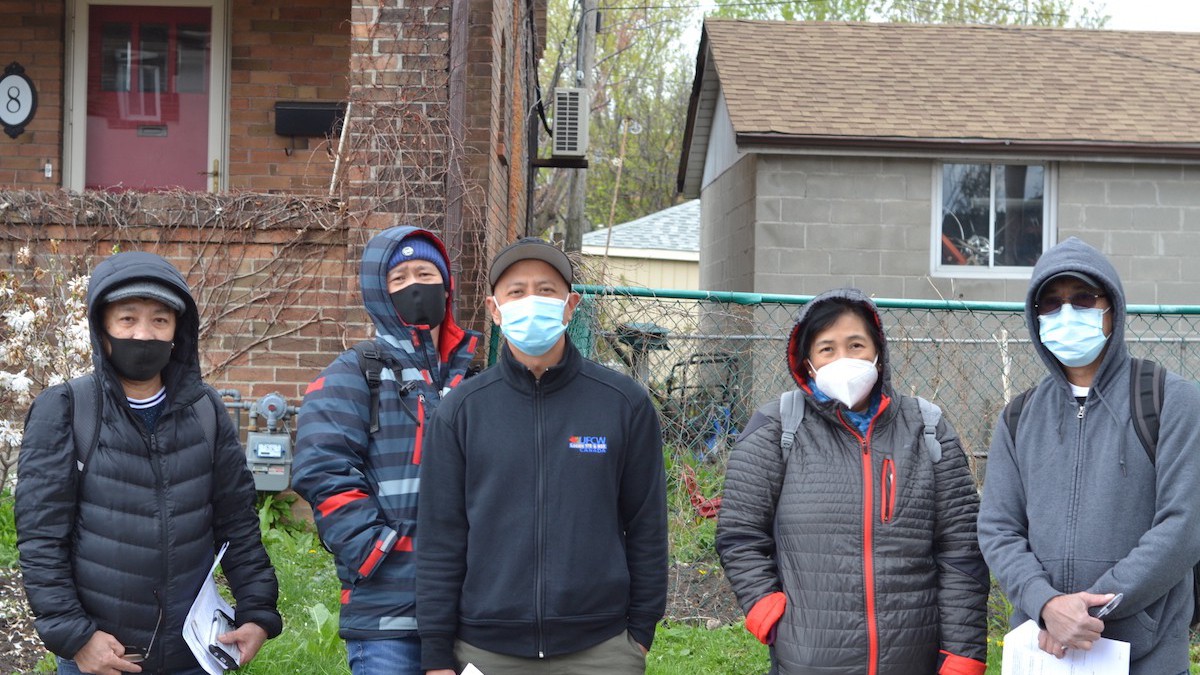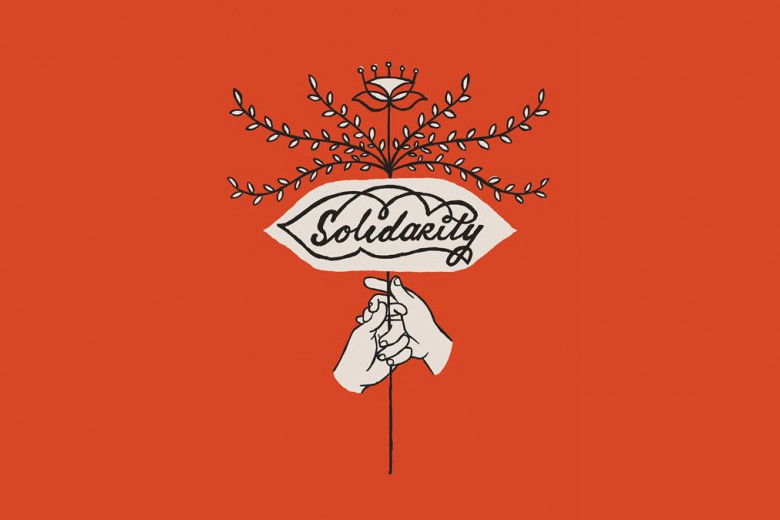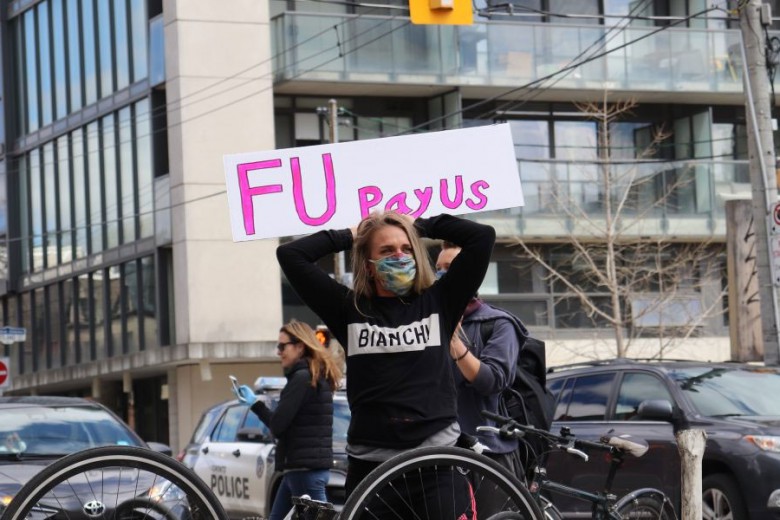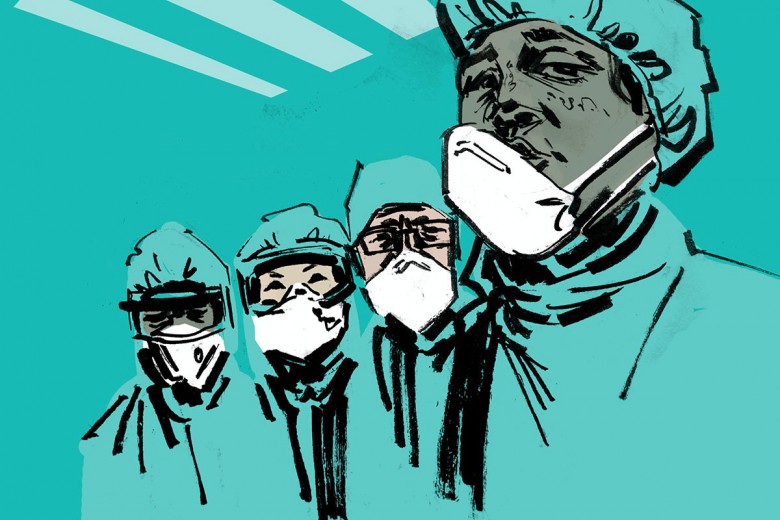In April 2020, COVID began spreading through the Cargill beef slaughterhouse near High River, Alberta. Nearly half of the plant’s 2,000 workers tested positive for COVID – making it, at one point, North America’s largest outbreak linked to a single site. Workers later told media they had been pressured to stay at work, given bonuses if they didn’t miss a shift, cleared to continue working despite showing symptoms, and told they’d be temporarily laid off without pay should they choose to stay home for various reasons. At the time, close to 70 per cent of workers at the plant were of Filipino descent.
It was an early warning of how the rest of the pandemic would play out for racialized working-class people. The Filipino community, in particular, has faced compounding challenges: layoffs and lack of work while struggling to send remittances to family in the Philippines; rising anti-Asian racism and violence; fear of accessing health care if undocumented; inequitable vaccine access; and COVID spreading through multi-generational households with essential workers. I spoke to five Filipino activists about the outsized burden Filipino communities in Canada have faced under COVID, and how community members have organized to help each other weather the pandemic.
Winnipeg: Diwa Marcelino
While I talk on the phone with Diwa Marcelino, our interview is periodically interrupted when Marcelino, a delivery driver, needs to ask people to sign for packages. Marcelino also works with Migrante Manitoba, advocating for worker safety in animal slaughterhouses. He tells me that not everyone knows that “Manitoba is hugely Filipino,” and explains that in the homes of Manitobans, “Tagalog is the second most-spoken language after English.”
The government of Manitoba collects statistics on COVID case distribution by ethnicity, and as it notes in its own March 2021 report, “Cases in Filipino people living in Manitoba show the greatest disparity in population size burden of COVID-19. Filipino women are slightly more affected [than] men.” Filipinos – who make up 7 per cent of Manitoba’s population – comprised 12 per cent of the province’s COVID cases.
Workers later told media they had been pressured to stay at work, given bonuses if they didn’t miss a shift, cleared to continue working despite showing symptoms, and told they’d be temporarily laid off without pay should they choose to stay home for various reasons.
The same report shows that of the Manitobans who got COVID and reported their employment status, 30 per cent worked in the food manufacturing industry. Marcelino says that meat-packers, many of whom are Filipino, are especially at risk: working in close quarters, meat-packing plants employ migrant workers, who often face precarious employment that is out of the media spotlight. Marcelino adds that these workers are least able to weather being laid off or told to quarantine without pay. “A lot of workers in the meat factory who get the sniffles or get a cold, they have to stop work and isolate until they get a negative COVID test. It’s very unfortunate when, by the nature of their work and housing issues and pay and temporary work, they often live in congregate settings because they can’t afford to live in a house – and also because they are paid minimum wage and have nothing,” he says.
Marcelino tells me that Manitoba’s vaccine rollout “hasn’t prioritized work in the meat sector. They prioritize age demographics, but not the actual workers who are most affected. Vaccinations are not getting into the arms of these workers. This is month 16 of the pandemic and they still don’t have a shot,” he tells me in April. Later that month, bowing to pressure from unions, the Manitoba government would finally announce that certain front-line workers in hot-spot communities – including those in food processing facilities – would get priority access to vaccines.
Toronto: Maria Sol Prieto-Pajadura
In the midst of one of Toronto’s seemingly endless semi-lockdowns, TTC busses are full in the early morning. Low-income workers are still commuting to their jobs, even as bus service is limited due to the pandemic. I always seem to run into Sol – as Maria Sol Prieto-Pajadura is often called – on the TTC. She tells me she works two or sometimes three jobs in different locations – as a daycare worker and elder caregiver, depending on the season, and also as a community organizer with Migrante Canada. It seems impossible for one person to do this much, yet she seems calm and unhurried.
“If you ride a bus right now, it’s mostly Filipinos going to work, because we work in the service industry: restaurants, coffee shops. We work in the factories,” she explains. “They are breaking their back to work on this essential work to support the economy of Canada, to support the health care of Canada, and yet we are invisible workers. Especially the undocumented, they are not being recognized.”
Toronto Public Health confirmed that they do not keep statistics on COVID-19 rates in the Filipino community. They do, however, keep statistics on the Latinx population, who work many of the same jobs as Filipinos in Toronto; the stats show that Latinx people are almost seven times more likely to get COVID-19 than white Torontonians.
Christine Mandegarian, a Filipina woman who worked as a personal support worker in a care home in the hard-hit Scarborough region of Toronto, was the second health-care worker in Ontario to die from COVID back in April 2020. While her death was covered extensively in the mainstream press, her ethnicity was rarely mentioned – even though personal support work, like live-in caregiver work, is largely done by women of colour. In a report for the Broadbent Institute, professor Ethel Tungohan wrote that “despite the importance of ‘essential’ labour during this crisis, it is striking to note that mainstream media coverage has mostly ignored the contributions provided by Filipino healthcare workers specifically and all migrant healthcare workers more generally.”
“If you ride a bus right now, it’s mostly Filipinos going to work, because we work in the service industry: restaurants, coffee shops.
Sol tells me about the work she’s been doing with Migrante Canada to support Filipino workers: “During the pandemic, most of our members are undocumented workers. So during this pandemic, they are the ones who have stopped working because of the lockdown or restrictions. But then they are not eligible for income support.” Without social insurance numbers, undocumented people were unable to apply for the Canada Emergency Response Benefit (CERB).
“We keep on contacting our members to see how they are doing. If they get COVID, we assess them, tell them when and how to go to the hospital, and encourage them not to be scared because the hospital doesn’t need a health card for them to access health services right now,” Sol explains.
When workers fall sick or lose work, Migrante has stepped in to provide food and funds. “Together with other organizations, we founded Kapit-Bisig. It’s a mutual aid support network,” she explains. Mutual aid has deep roots in Filipino culture, Sol tells me, and the name “Kapit-Bisig” translates to “linking arms” in Tagalog. “We access FoodShare [a Toronto-based food justice project] to give food boxes to our members, and we accessed other NGOs that could access income support from the government and give it to vulnerable sectors of society,” she adds.
“During the pandemic, most of our members are undocumented workers. So during this pandemic, they are the ones who have stopped working because of the lockdown or restrictions. But then they are not eligible for income support.”
Throughout my interviews, I hear again and again that the lives of Filipino community members in Canada are made more difficult by their precarious immigration status. “Immigration policies in Canada have always been discriminatory to migrant workers,” Sol tells me. “In [the] 1900s, when women came here from Europe to do care work, they got permanent residence. But when Caribbean women started doing caregiving work, they become disposable: they didn’t get permanent status [on arrival]. This continued with Filipinos, both being discriminated against on [the basis of] race and class.”
In April, the Canadian government announced it was creating new pathways to permanent residency for 90,000 essential migrant workers and international graduates on a first-come, first-served basis. While it’s a partial win, the Migrant Rights Network has estimated that the program’s restrictions exclude 1.18 million undocumented people, refugees, international students, and migrants in Quebec. Instead of restrictive, piecemeal pilot programs, migrant justice organizers continue to call for all migrants to receive permanent residency upon arrival in Canada.
Vancouver & Lower Mainland, B.C.: Alex
Alex – who asked that we use only his first name, because of repression against organizers – lives in Vancouver and organizes with a Filipino youth organization called Sulong. He says that migrant worker programs have structured the lives of many in his community, with countless people his age – in their 30s – having parents who came to Canada under the Temporary Foreign Worker Program as live-in caregivers. Today, “a large majority of working Filipinos are some form of migrant labour: Tim Hortons fast-food restaurants, or custodial staff [in] buildings, sometimes delivery truck drivers, or warehouse [workers] – but [the] majority doing some kind of service-based work,” he tells me.
Alex says some long-term hotel workers have even been told by their bosses that if they were to return to work they would be forced to take a wage cut and be paid minimum wage.
He says that a lot of the Filipino community organizing in B.C. focuses on specific conditions in the Lower Mainland. For example, with astronomically high rents in the Vancouver area, CERB payments were not enough for laid-off workers to pay rent and meet their other basic needs. This became obvious in B.C.’s hotel industry, when thousands of hotel workers were laid off during the pandemic. Hotels have refused to guarantee that workers can return to their jobs once it’s safe to work, and Alex says some long-term hotel workers have even been told by their bosses that if they were to return to work they would be forced to take a wage cut and be paid minimum wage. Women make up over 60 per cent of hotel workers in B.C., and many of them are Filipina. In response, Unite Here Local 40 launched a campaign called “B.C.’s unequal women” to urge customers to boycott the hotels that won’t promise to bring workers back to their jobs.
Despite pressure from Filipino groups over the last year, Alex says “the provincial government in B.C. does not keep statistics on specific ethnic/racial demographics on who is being affected [by COVID]. Dr. Bonnie Henry [B.C.’s provincial health officer] just denies the significance of that.” But he adds that it’s common knowledge that the disproportionate number of Filipina women who work as care aides in long-term care homes have been at high risk of contracting COVID. In April 2020, 70 per cent of B.C. senior care workers said they were experiencing a critical shortage of personal protective equipment like masks and hand sanitizer. To make up for low wages in private care homes, care aides often took jobs in multiple facilities, increasing their chance of contracting and transmitting the virus. In May 2020, Henry issued a single-site order for workers at 533 facilities in B.C., but it meant many workers struggled to make ends meet while they waited for the province’s $4/hour pay top-up to come through.
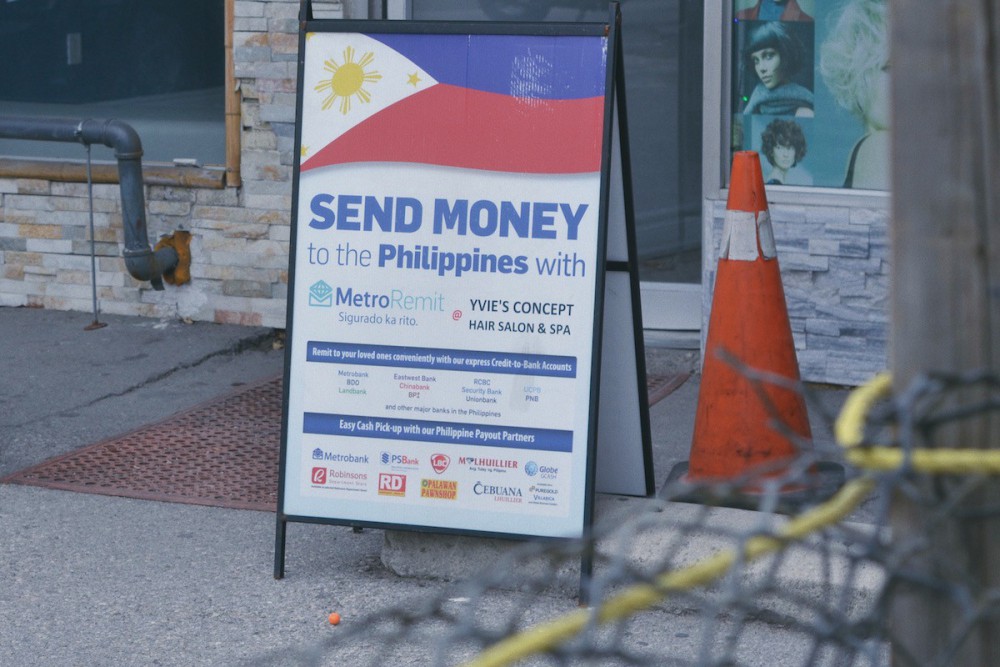
Links to the Philippines: Rosie Lucente & Jesson Reyes
“We don’t forget that the root cause of migration is because of conditions in the Philippines. That’s why we also fight to address those things,” says Rosie Lucente, the chairperson of the Filipino youth group Anakbayan Toronto. Lucente immigrated to Canada in 2019 and she explains that the struggles faced by working-class Filipinos in Canada “are compounded by what’s happening back home. We have to continuously support our families back home.” She says that it’s for this reason that Anakbayan Toronto advocates for national liberation and genuine democracy in the Philippines, where high rates of extreme poverty, extrajudicial police killings of left-wing activists, and President Rodrigo Duterte’s bloody, five-year-long “war on drugs” have led to a deteriorating human rights situation.
“The economy in the Philippines is dependent on remittances from overseas,” says Jesson Reyes, the managing director of the Migrants Resource Centre Canada. According to the World Bank, 9.3 per cent of the country’s GDP came from remittances in 2019. “This is a deliberate economic policy,” Reyes adds, explaining that since the ’70s, the Philippines has prioritized training workers for jobs overseas to quell social unrest due to joblessness and poverty.
“Not only is there not enough aid but there’s also a heavily militarized COVID lockdown under Duterte."
He explains that the pressure to support relatives at home has put Filipinos around the world and in Canada in a tough position. For example, Filipinos make up about a third of workers on cruise ships around the world, and COVID restrictions meant that thousands were stranded at sea – sometimes for months – and then repatriated en masse to the Philippines. Reyes says that COVID has increased economic pressure on those who still have jobs abroad to send money back, even though they themselves are struggling.
“Not only is there not enough aid but there’s also a heavily militarized COVID lockdown under Duterte,” Lucente adds. “There are military checkpoints in sections of the city. They’ve arrested tens of thousands of people during COVID. Community pantries are shut down as ‘acts of communist terrorism.’ So not only are our communities struggling harder, we are also worried about the political conditions back home.”
Lucente says the Filipino-Canadian community’s strength comes from its organization – like the 26 groups from B.C., Alberta, Manitoba, Ontario, and Quebec that have joined the Kapit-Bisig network. “Among Filipino youth […] we have organizations banding together to fight for immediate things like our rights and welfare, wages, social issues but also for a better society in the Philippines at large,” Lucente notes. “We have organization.”


